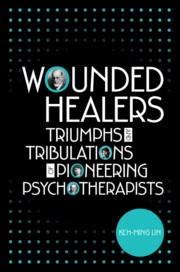Book contents
- Wounded Healers
- Advance Praise for Wounded Healers
- Wounded Healers
- Copyright page
- Contents
- Acknowledgments
- Introduction
- Part I Fin-de-Siècle Vienna
- 1 Sometimes a Cigar Is Just a Cigar
- 2 A Most Dangerous Method
- 3 We Are Abel: We Are Cain
- 4 Fear of Death and Trauma of Birth
- 5 From Character Analysis to Cloud Busting
- 6 Ernest Jones
- 7 Estranged Brilliance
- 8 When Freud Met Tiffany
- 9 Phoenix Forever
- Part II From Sea to Shining Sea
- References
- Index
5 - From Character Analysis to Cloud Busting
Wilhelm Reich; the Lonely Prophet
from Part I - Fin-de-Siècle Vienna
Published online by Cambridge University Press: 17 December 2020
- Wounded Healers
- Advance Praise for Wounded Healers
- Wounded Healers
- Copyright page
- Contents
- Acknowledgments
- Introduction
- Part I Fin-de-Siècle Vienna
- 1 Sometimes a Cigar Is Just a Cigar
- 2 A Most Dangerous Method
- 3 We Are Abel: We Are Cain
- 4 Fear of Death and Trauma of Birth
- 5 From Character Analysis to Cloud Busting
- 6 Ernest Jones
- 7 Estranged Brilliance
- 8 When Freud Met Tiffany
- 9 Phoenix Forever
- Part II From Sea to Shining Sea
- References
- Index
Summary
Reich’s childhood and adolescence were heavily burdened by his mother’s infidelity and suicide, and his sense of guilt in causing the unraveling of his family. After World War I he became centrally involved in Freud’s psychoanalytic movement as well as Marxist organizations, and actively promoted sexual education. In 1930, after running afoul of his Viennese colleagues, he moved to Berlin, Norway, and eventually the USA. His “character analysis” became a classic in psychoanalytical literature. Combining body work with psychotherapy, he also developed “vegetotherapy.” His search for the source of life force led to his “discovery” of “orgone energy” and the invention of the “orgone accumulator,” touted as an effective method for combating cancer and other serious medical conditions. Ensuing FDA investigations led to his imprisonment. He also developed an intricate delusional system involving space aliens, Stalin, and federal agencies interfering with his work to promote health, as well as improving weather. This work eventually led to the development of “cloudbusters,” for rainmaking and for defending against the influence of space aliens. Although controversial, his ideas and inventions remain influential and are widely used today.
Keywords
- Type
- Chapter
- Information
- Wounded HealersTribulations and Triumphs of Pioneering Psychotherapists, pp. 64 - 75Publisher: Cambridge University PressPrint publication year: 2020



